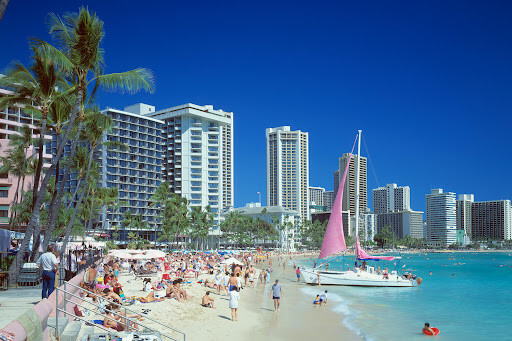
The idyllic shores and volcanic landscapes of Hawaii, a perennial favorite for travelers worldwide, are poised to become a slightly more expensive destination. The Aloha State has recently enacted legislation to increase its transient accommodations tax (TAT), commonly known as the hotel tax, from 10.25% to 11%. This 0.75 percentage point rise, coupled with existing county-level taxes and the state's general excise tax, could push the total tax burden on tourists' lodging expenses to nearly 19%, a significant consideration for those planning a Hawaiian getaway. The new tax rate is slated to take effect on January 1st of the coming year.
The driving force behind this tax hike, according to state officials, is a commitment to environmental stewardship. Hawaii, despite its relatively small permanent population of around 1.4 million residents, welcomes over ten million tourists annually. This influx, while vital to the state's economy, places considerable strain on its delicate natural resources. The state government argues that those who come to appreciate and utilize these resources should contribute directly to their preservation for future generations.
Governor Josh Green has been a vocal proponent of the tax increase, emphasizing the intrinsic link between Hawaii's natural beauty and its tourism appeal. "People come here to enjoy Hawaii's beautiful natural environment," he stated, as reported by local news outlets. "It is a reasonable expectation that visitors contribute to the very resources they are here to enjoy." The anticipated $100 million in additional annual revenue generated by the increased TAT will be earmarked specifically for environmental protection and restoration initiatives. These funds are intended to address critical issues such as combating coastal erosion, preventing devastating wildfires, and bolstering the state's resilience against the impacts of climate change, including rising sea levels and extreme weather events, which pose a significant threat to the islands' infrastructure and ecosystems.
While the environmental objectives are laudable, the decision has sparked concerns within the state's vital tourism sector. Industry leaders worry that adding to Hawaii's already high cost of living and travel could deter potential visitors, making the islands less competitive with other vacation destinations, particularly those in Mexico and the Caribbean, which often offer more affordable options. John Felle of the Maui Hotel & Lodging Association articulated this apprehension, stating to the Associated Press, "Our concern is that Hawaii is becoming an increasingly expensive destination. We have to be careful about the cumulative impact of these tax increases on our visitor industry." He cautioned that an excessive tax burden could lead tourists to seek more budget-friendly alternatives, ultimately harming the very industry that sustains the state's economy.
These concerns are echoed by some tourists themselves. While many acknowledge the importance of environmental preservation, the prospect of higher accommodation costs is a tangible disincentive. "Of course, higher taxes make it more expensive," commented a visitor from the mainland United States in an online forum dedicated to Hawaiian travel. "You have to factor that into your overall budget, and it might make you think twice about the length of your stay or even choosing Hawaii in the first place." However, as the tourist from Chicago noted in the initial report, transparency and demonstrable evidence that the funds are indeed being used effectively for environmental protection could mitigate some of this resistance.
The debate surrounding the TAT increase highlights the delicate balance between economic development and environmental sustainability, a challenge faced by many popular tourist destinations globally. Hawaii's reliance on tourism makes this balance particularly critical. According to the Hawaii Tourism Authority, the industry directly and indirectly supports a significant portion of the state's jobs and contributes billions of dollars to its economy annually. Any measure that could potentially dampen visitor numbers requires careful consideration of its long-term economic consequences.
Furthermore, the implementation of the increased tax comes at a time when global travel patterns are still recovering from the disruptions caused by the pandemic. While Hawaii has seen a rebound in tourism, the industry remains sensitive to factors that could influence travel decisions, such as economic uncertainty and rising costs. Some industry analysts suggest that the state should explore alternative funding mechanisms for environmental initiatives that do not directly impact the cost of visitor accommodations, such as increasing fees for specific activities or implementing carbon offset programs.
The success of this tax increase in achieving its environmental goals will depend heavily on how the funds are managed and the transparency with which they are allocated. Public trust and the perception that the tax revenue is genuinely contributing to the preservation of Hawaii's natural heritage will be crucial in garnering support from both residents and visitors. The state government will likely need to provide clear and regular updates on the environmental projects funded by the increased TAT to demonstrate its commitment to its stated objectives.
Ultimately, Hawaii's decision to raise the hotel tax represents a bold step towards prioritizing environmental sustainability within its tourism model. Whether this move will effectively balance environmental goals with the economic realities of the tourism industry remains to be seen. The implementation of the new tax in January 2026 will be closely monitored by both industry stakeholders and environmental advocates, as its impact on visitor numbers and the state's environmental health unfolds. The world will be watching to see if Hawaii can successfully navigate this complex challenge and emerge as a leader in sustainable tourism practices.
[Copyright (c) Global Economic Times. All Rights Reserved.]




























